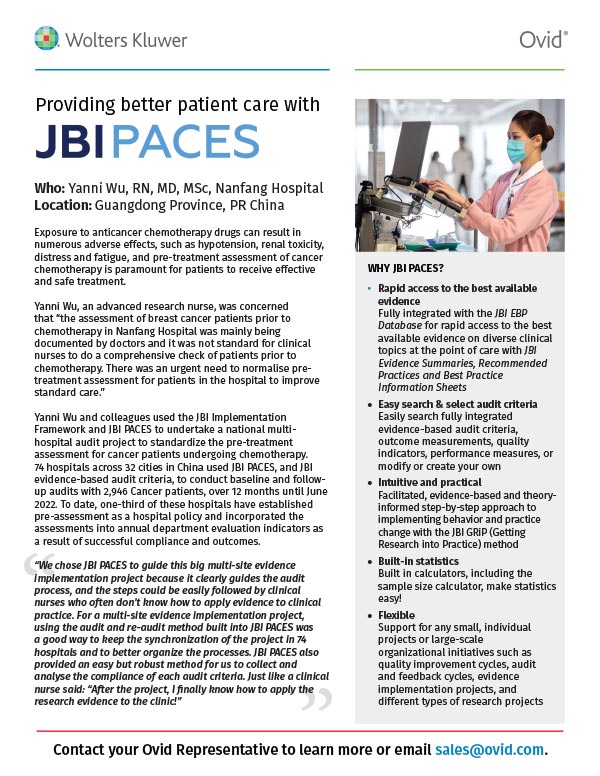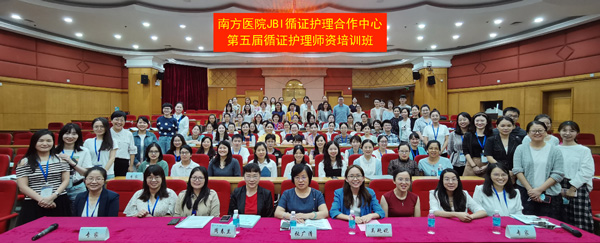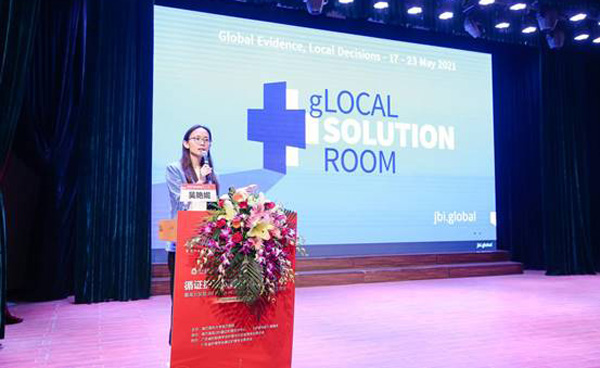Providing better patient care with the JBI EBP Database

June 2025
Yanni Wu, RN, PhD, Nanfang Hospital
Jie Lai, RN, MSc, Nanfang Hospital
Guangdong Province, PR China
In recent years, there has been a growing focus on evidence-based practice (EBP) globally, and numerous benefits of EBP have been identified. As JBI collaborations have become established in China, an increasing number of Chinese scholars have drawn on evidence from the JBI EBP Database to publish research articles. To date, a total of 1,193 Chinese articles, including EBP projects and evidence summaries, have used the database to support healthcare professionals and organisations in delivering quality care to patients and consumers.
Yanni Wu, Vice Director of the Nanfang Nursing Centre of Evidence-based Practice: A JBI Centre of Excellence in Guangzhou, China, is a dedicated advocate of EBP. To provide more clinical nurses with an understanding of evidence-based nursing and the use of the JBI EBP Database in clinical practice, Yanni has worked tirelessly, overseeing the provision of numerous workshops and education courses. To date, more than 600 clinical nurses from 139 hospitals have completed the EBP program at the centre. Since the establishment of the program, 446 EBP projects have been conducted across 139 hospitals, all drawing upon evidence from the JBI EBP Database. These initiatives have had an important impact on patient outcomes. For example, the rate of assessing for deep vein thrombosis (DVT) risk in RICU patients rose dramatically from 0% to 100%, which reduced the incidence of DVT in these patients. Furthermore, more than 20 clinical guidelines or best practices informed by JBI EBP Database resources have been developed over the last 4 years, significantly affecting policy development for clinical practice.

During this period, numerous clinical nurses have become champions of EBP. Consequently, evidence from the JBI EBP Database has significantly improved the quality of nursing practice in clinics. For example, a clinical nurse in the Department of Radiotherapy at Nanfang Hospital has successfully undertaken five best practice projects over the last 5 years. All these projects used evidence-based audit criteria derived from the JBI EBP Database, and all were successfully published in JBI peer-reviewed journals to disseminate the experience to others.
“All of the best practice topics that I have covered, such as the assessment and management of coughing among patients with lung cancer in a radiotherapy department, assessment and non-pharmacological management for patients with cancer anorexia-cachexia syndrome, and assessment and management of radiation-induced trismus in patients with nasopharyngeal carcinoma are all based on the needs of clinical practice. These programs have improved our department's nursing practices as well as patient outcomes. For example, after our project on nutritional interventions for patients with oral mucositis resulting from cancer treatment, the nurses performed weight measurements, BMI calculations, and nutritional assessments for each patient every Monday, and the nutrition nurse reported the patients who had a nutritional score greater than three points and/or a weight loss greater than 2% every Tuesday. These measures ensured that the nutritional status of patients could be tracked dynamically.”

When asked why she spends so much of her time doing this, the nurse replied,
"As a clinical nurse, my goal in conducting clinical audits is to improve the quality of clinical services and to provide more effective care to patients. As long as patients receive better care, I am very happy.”
To further promote EBP, Yanni recently conducted a national multi-site best practice project using evidence from the JBI EBP Database to standardise the pre-treatment assessment for cancer patients undergoing chemotherapy. To date, 74 hospitals have successfully completed the project, with one-third of these hospitals incorporating pre-assessment as a routine nursing practice.
Lessons for the future
Through the JBI evidence implementation approach and the resources available from the JBI EBP Database, the JBI Centre in Nanfang has successfully and rapidly rolled out the best evidence into clinics. As one of the clinical nurses in the Nanfang Hospital stated, "Clinical nursing methods need to be more scientific, and evidence-based nursing is the mainstream of nursing in the future." With resources from the JBI EBP Database, we can produce high-quality evidence and ensure better uptake in the clinic. However, the challenge of sustaining best practice in the clinic over the long term remains a persistent issue. To address this problem, the implementation of evidence needs to be smarter and more informative to reduce the workload of clinical nurses. Therefore, in the future, the discipline of nursing will need to intersect with more disciplines, especially artificial intelligence.
